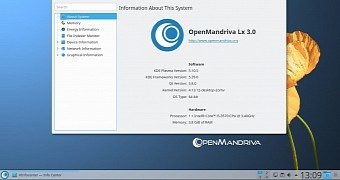While waiting for the forthcoming OpenMandriva Lx 4 operating system series, users of the current OpenMandriva Lx 3 release have received numerous updated packages.
The OpenMandriva development team announced over the weekend that a long list of updated packages await users of the OpenMandriva Lx 3 operating system series, which include the recently released KDE Plasma 5.12.6 LTS desktop environment and Mozilla Firefox 61.0.1 web browser.
"Good news for OpenMandriva Lx 3 users. While OpenMandriva Lx 4.0 in on the way, we keep taking care of OMLx 3.03. Developers crisb, itchka, and TPG have made available a long list of updated packages just released to our updates repositories after the normal testing," reads the announcement.
Several other KDE components have been updated as well to keep OpenMandriva Lx 3 a stable and reliable operating system. Also, users can now install the latest Mozilla Thunderbird 52.9.0 email and news client, LibreOffice 6.0.5 office suite, Quassel 0.12.5 IRC client, as well as the Qt 5.9.6 LTS app framework and Mesa 18.1.3 graphics stack.
OpenMandriva Lx 4 coming soon with latest GNU/Linux technologies
Meanwhile, OpenMandriva works hard to bring you the OpenMandriva Lx 4 release, which will ship with the latest KDE Plasma 5.13 desktop environment, accompanied by the KDE Applications 18.04.3 and KDE Frameworks 5.48.0 software suites, all built against the Qt 5.11.1 application framework.
Under the hood, OpenMandriva Lx 4 will use the LLVM/Clang 7 and GCC (GNU Compiler Collection) 8.1 system compilers, as well as Glibc (GNU C Library) 2.27 and Python 3.7. In addition to the KDE Plasma 5.13 desktop environment, users will also be able to install the LXQt 0.13.0 and Lumina 1.4.0 desktops.
OpenMandriva Lx 4 could be powered by either Linux kernel 4.17 or the upcoming Linux 4.18 kernel and will use the latest RPM4 and DNF package management systems. Other than that, OpenMandriva Lx 4 promises to be the first release of the GNU/Linux distribution to support ARM64 (AArch64) and ARM v7 architectures, which means it will work on Raspberry Pi and similar single-board computers.

 14 DAY TRIAL //
14 DAY TRIAL //